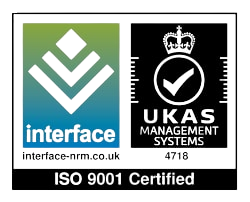Logical reasoning pre-employment assessment tests for recruitment
Are you a talent acquisition specialist, recruiter, HR expert or a hiring manager? You are most likely using various assessment tools to help you find and hire the best-fit candidate, fast. These tools may include aptitude tests, video interviews, assessment centres or even assessment games.
You may ask yourself the following questions:
- why should I use logical reasoning tests in hiring
- how do I use logical reasoning tests in my company hiring process
- how do I interpret and understand the results to select the best candidates and avoid bias
- how do I use these tests to build diverse teams
and much more.
This article will provide you with comprehensive, easy to read and understandable knowledge about one of the most widely used psychometric tests used in recruitment and candidate selection – the pre-employment logical reasoning test.
Let’s start with the funnel. If you have worked in recruitment, you perfectly understand that an effectively designed candidate selection process should form a funnel that helps you identify and choose the best candidates at every stage, do it at a reasonable cost and still fit within the timelines requested by the business.
Not an easy task in the times of LinkedIn and ability to apply to 100+ jobs with one click. Recruiters need to have a portfolio of tools that helps them select the best candidates, fast and without spending thousands of dollars, pounds, or euros.
Designing a properly functioning recruitment funnel helps a lot.
The hiring funnel is the series of stages through which a candidate’s consideration for employment progresses. You may have already guessed why it is called the ‘funnel’ – this is because of the shape and analogy. Many candidates enter the funnel, but few proceed through all the stages and are hired. The logical tests used in recruitment sit at the very top of the funnel.
This article unveils key aspects of the logical reasoning tests and their use case in hiring. You will learn what logical tests are, pros and cons of using them, which roles would benefit the most from their use, when they should be used and what to consider when selecting a test provider.
Keep reading to find out more and if you have any questions, just contact us. Assess Candidates are a team of organisational psychologists and recruiters and we are here to help you.
Contents:
- What is a pre-employment logical reasoning test?
- How do logical reasoning tests work in recruitment?
- What is covered in logical reasoning tests?
- Why use logical reasoning pre-employment tests in hiring? Pros and cons.
- When should the logical test be used to hire?
- How effective are logical reasoning tests for engaging candidate experience?
- Which roles can the logical reasoning test be used to recruit for?
- Why use Assess Candidates logical reasoning tests to hire?
1. What is a pre-employment logical reasoning assessment?
Pre-employment Logical Reasoning Tests assess a person’s logical ability when using the information provided in the form of sequences and diagrams containing various shapes, number sequences. The task for candidates is simple: find the next diagram, number, shape that comes in the sequence.
As a recruiter, many jobs you advertise require problem-solving as it is a highly valued skill. The logical reasoning tests examine how innate those skills are. As a result, the logical reasoning test is a common part of the recruitment process and sits at the very beginning of it.
Logic allows us to analyse the world around us, draw conclusions, accumulate the necessary data and problem solve through workplace situations. This is why you want to identify the candidates having this skill and ability early in the process. To retain the best, to save time, to save money.
As a matter of fact, logical reasoning recruitment tests are:
- widely used in recruitment by thousands of companies to sift candidates during the recruitment process through measuring a candidate’s non-verbal skills and ability to solve problems
- used in recruitment at any level of hiring, from entry level to senior jobs. The complexity of patterns may be different depending on the level of the job
- usually set out as a series of multiple-choice questions. The task for the candidate is to select one from a number of choices to indicate what comes next in a sequence. They need to do this by identifying the pattern in the positioning, direction, numbers, and shapes across the sequence.
- typically timed to present candidates with the urgency that we often find in the workplace. Typically test-sitters have 1 minute per question
- can be used to test a different range of targeted skills, for example, abstract reasoning targets a candidate’s ability to think laterally and recognise patterns whereas diagrammatic reasoning targets a candidate’s ability to understand the concepts and information that is visualised with the use of diagrams and figures.
For recruiters and hiring managers, logical reasoning tests form a fundamental part of the selection process supporting in finding those applicants that have the ability to fill the requirements of the role.
Keep reading to find out more how you and your organization can benefit from using logical recruitment tests.

2. How do logical tests actually work in hiring?
In logical reasoning tests, candidates are presented with a logical sequence and asked to reason with this in various ways. As such, logical reasoning allows a candidate to demonstrate their logical aptitude. With a demanding time-limit alone, candidates are challenged to balance their speed and accuracy in working to complete the test.
Known for their ability to accurately predict candidate future performance, logical tests have withstood the test of time (used for several decades), having once been taken using a paper and pen. Yet, despite the move to online, logical tests remain a staple tool for dozens of thousands of employers globally and when assessing for all levels of candidate from entry level to senior positions.
A logical reasoning test will be one of the first steps in your recruitment process, typically following the sifting of job applications and the screening process.
By inviting every candidate to take a logical reasoning test, you can discount those who don’t meet a certain standard. You simply set a threshold and allow only candidates who scored above a certain percentile (typically the 30th percentile) to move to the next stage. This is an easy way to assess candidates in the first recruitment stage before moving on to next stages like other aptitude tests, assessment centres or the interview process.
Let us now see how this process could work in your organization.
The assessment process or sometimes more well known as the recruitment funnel, is usually set out in various stages:
- It first starts with the candidate filling in the application and uploading a CV
- The second stage is likely to be the numerical reasoning test, logical reasoning test or another type of aptitude test
- Recruiters then go through the process of selecting candidates for the next recruitment stages and typically move on to further psychometric testing (e.g. personality, situational judgement), game assessments followed by assessment centres and video/in-person interviews
When a recruiter or a human resources specialist invites pre-screened candidates to online logical tests, the candidates have a dedicated period (usually several days) to complete the tests at home. The recruiter then reviews the results via an online report and selects the candidates to move to another round of the assessments.
There are a handful of companies on the market providing logical test solutions. Rarely you will need a bespoke solution. Off-the-shelf logical tests will do the job. Make sure they can prove that their tests have been created and validated by professional organisational psychologists and psychometricians. Otherwise, these tests will not deliver on selecting the right candidates.
Important. Often logical tests are used in conjunction with other psychometric tests so the decision to qualify a candidate to the next round may be based on combined results as well as on the type of role. If you would like to get a better understanding of how to use logical (and other) reasoning assessments, please contact us for free advice.

3. What is covered in logical reasoning tests?
The logical reasoning test is one of the top predictors of a candidate’s ability to understand cause and effect relationships. As you may know, this will be a very helpful addition to your workplace.
In a data-driven environment, it is essential that employees have strong logical reasoning skills.
Logical reasoning questions will test candidates in a variety of ways, applicants may be asked to:
- Deduce trends
- Identify patterns
- Analyse arguments
- Draw conclusions
- Interpret relationships
- Identify flaws
The logical reasoning test will demonstrate an individual’s ability to keep calm under pressure and solve non-verbal and logical problems.
Aptitude test publishers provide a variety of different pre-employment logical test types, like diagrammatic and abstract reasoning for organisations that use them in their hiring process. The areas listed above are the most common to be covered.
Logical reasoning, in combination with other cognitive skills, is an important quality to develop when dealing with most, if not all, workplace situations. It helps candidates to be aware of making important decisions in the workplace, discern the truth, solve problems, come up with new ideas and set achievable goals.
Further in the text you will find specific roles where the use of logical recruitment tests in the job interview process is highly recommended.
To help you visualise the questions, here are examples of a pre-employment logical reasoning test question with worked solutions:
Example 1
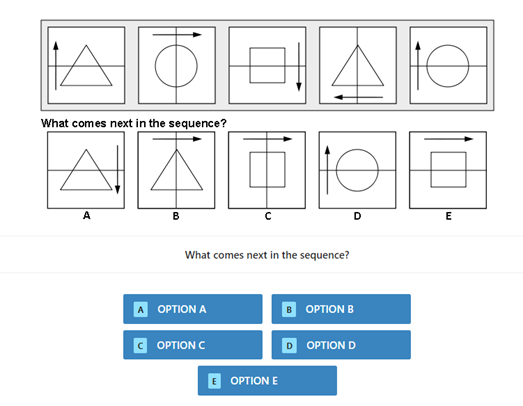
This question has been designed to assess a candidate’s logical reasoning ability using the information provided in a sequence of five diagrams containing various shapes.
When a candidate is approaching a logical reasoning question like the one above, they will have to think methodically. This question is a typical example of the logical reasoning assessment.
The task:
- the candidate must look at the diagrams carefully and identify the rules and logic that underpin the changes in the sequence to determine what comes next
- the candidate must identify what shapes come next in the sequence and select the answer from the 5 options labelled A-E
Average time per question: 60 seconds
The logical test typically contains 14-25 questions
Focusing on the top table of sequences, applicants must think logically about what comes next.
Logical test example 1 worked solution:
- The first step indicates that the arrow moves 90 degrees clockwise.
- The shape follows the pattern: triangle, circle, square, triangle and so forth.
- The line in the centre follows the pattern horizontal, then vertical, then horizontal.
Answer: The correct option must be vertical meaning the answer is C
Example 2
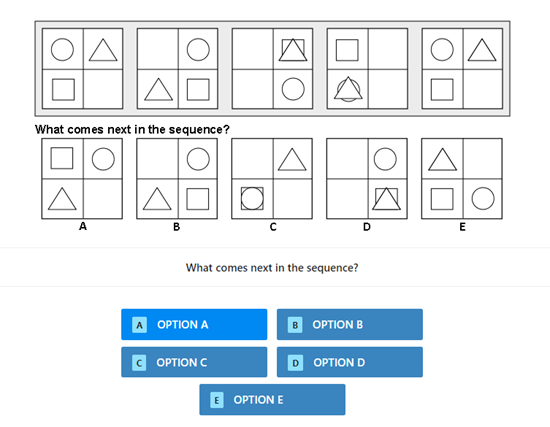
This logical reasoning question is another example of a common question candidates will face. This is similar to the first question because it is testing the shapes moving around the boxes.
Logical test example 2 worked solution:
- The circle moves one step clockwise across the sequence.
- The triangle moves diagonally as you move across the sequence.
- The square moves one step anti-clockwise across the sequence.
Answer: Option B is the correct answer
Example 3
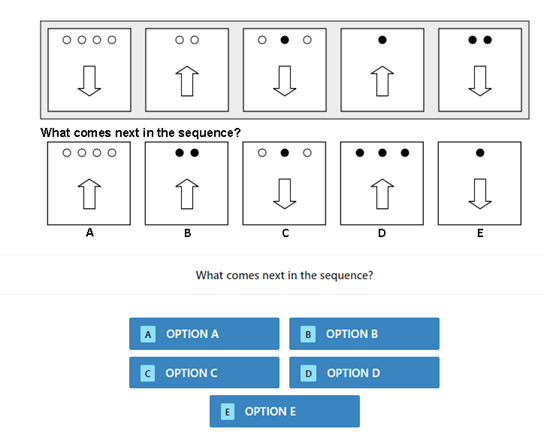
Question 3 is a bit different to the two above. It uses arrows and dots in a different format. The same applies, candidates must work out the answer relating to the rotation and colour of the dots and arrows.
Logical test example 3 worked solution:
- The arrow in the centre alternates from pointing downwards to upwards across the sequence.
- The rule for the dots is minus 2 dots, plus one black dot, and repeat.
Answer: B is the correct answer.
There are many different types of logical reasoning tests however it is important to note that these terms are sometimes used interchangeably, depending on who the assessment tests publisher is.
Understanding these tests will help you decide which is the best test for your organisation and navigate the sometimes very new world of psychometrics terminology.
Types of pre-employment logical reasoning tests:
- General logical reasoning tests are most commonly used and assess a person’s logical ability when using the information provided in the form of sequences and diagrams containing various shapes, number sequences. The task for candidates is simple: find the next diagram, number, shape that comes in the sequence.
- Abstract reasoning tests examine a candidate’s lateral thinking ability. They will be required to spot underlying trends and patterns between images that follow a logical sequence. Abstract reasoning tests examine a candidate’s ability to identify relationships between these changes, for example by finding a missing figure in the sequence or spotting the right code.
- Diagrammatic reasoning is a type of abstract reasoning test which would often use a flowchart of diagrams with the inputs and outputs, as well as defined symbols. Candidates will have to examine which of the inputs affect diagrams and then create an output based on the rules contained in the flow chart.
- Inductive reasoning tests measure the ability of the candidate to reach conclusions based on the premise of probability. This is very important in the work environment. The tests will require candidates to follow and identify the sequence patterns and then select the right answer.
- Deductive reasoning tests are based on candidates arriving at a conclusion based on the premise of certainty. These kinds of tests predict how applicants would perform when drawing conclusions from logical arguments based on data.
You may be wondering now what the benefits of using logical reasoning tests in a recruitment process are. Let’s find out.

4. Why use Logical reasoning pre-employment tests in hiring? Pros and Cons.
8 REASONS (PROS) TO USE LOGICAL REASONING ASSESSMENTS IN RECRUITMENT
- Increased quality of hires – logical tests used in hiring are a proven (for several decades) accurate method of predicting candidates’ ability to work with logical data and their likelihood of success within the organisation based on their core mental abilities.
- Efficient, low cost per candidate – logical tests are distributed and completed online, so no paper, printing, or postage fees. They are typically priced per test (candidate) or using a flat fee for a maximum number of tests used. This approach helps to minimise the costs for volume recruitment and enable testing of thousands of candidates at low fees.
- Speed – thousands of candidates can be tested in a matter of days and the results are available immediately after test completion. It is very easy and fast to select candidates that meet a given threshold using the backend admin tools. Typically, the admin module will allow for scenario playing as well (e.g., apply different criteria to different populations).
- Reduce bias – logical tests are indiscriminate. They just assess a person’s abilities without considering any other factors like, age, gender, ethnicity; the results can therefore be easily defendable in case of a legal challenge.
- Increased diversity – companies can make informed hiring decisions (e.g. by changing cut-off rates) to increase diversity by looking for traits, knowledge and thinking styles missing from their current team.
- Easily compare candidates – different people will bring their own unique skill set to the position you are advertising, so how could you ever know if one would be better than the other? That’s where logical tests can help you out. They give you data to easily compare candidates against each other and determine exactly who comes out on top.
- Predict job performance – logic testing can be an excellent predictor of job performance. As you are testing the individual on a skill that’s highly relevant to the job they are applying for, the results will give you a good indication of their future performance in the role. This can help you to be more confident when making your hiring decisions.
- Improve retention – when you hire people who have the capabilities to perform in the role they were hired to do, they will likely have far more job satisfaction. By helping you to hire the right people the first time around, logic testing can boost productivity and reduce turnover rate when it is made a permanent part of the recruitment process.

5 POINTS (CONS) TO CONSIDER WHEN USING LOGICAL REASONING TESTS:
- Can cause a candidate anxiety – completing logical tests, like any assessment, can cause stress and anxiety to candidates. Some applicants may struggle to convince themselves of the more logical and reasoned response due to the unhelpful thoughts that have contributed to the development of anxiety.
- By encouraging the candidates to practice the test beforehand it will make them more at ease when tackling the assessment and will present their true ability under typical working conditions.
- Using logical tests in isolation – a logical test does not paint the full picture; just because a candidate does well on the test does not mean they will perform well in the real world. However, if the logical test is used alongside other assessments employers will get a good idea of an applicant’s true abilities.
- Consider soft skills too – logical reasoning tests alone do not shed light on a candidate’s soft skills. In almost any job these days, one requires not only a high level of mental ability but also emotional intelligence and beyond. It is recommended that applicants are assessed for their soft skills further in the recruitment process, as this will complement and help paint a fuller picture of the candidate.
- Cheating – it is technically possible that an online logical test can be cheated and completed by someone else. Therefore, while looking for solutions on the market, consider checking what measures the test providers offer to prevent cheating.
- Early Judgement– sole dependence on logical tests scores can mean it may not be the ideal way to accept or reject an individual. Logical tests can be used with other traditional tests such as numerical or verbal reasoning to make sure candidates are being assessed on other parameters.
With more of an understanding on the benefits of logical reasoning tests in hiring and potential drawbacks, we will now go on to discuss when employers should use logical reasoning tests to recruit.

5. When should the logical reasoning test be used to recruit?
Logical reasoning tests can be used at your organisation to help make better hiring decisions and more accurately assess candidates’ capacity to perform the job. The ability to solve problems well is a worldwide skill. Thus, these tests can be used to help select candidates for multiple roles.
Logical tests are also broadly used in internal development programs to assess employees who are already in the job either for further development or promotion.
When logical reasoning tests are used in recruitment, you can expect the test to outline one aspect of the candidate’s core abilities, following the candidate’s success in the first stage of the application, which is typically online. By combining logical reasoning with a breadth of assessments assessing their personality, competence, and skills, this means that all qualities are measured with an equal weighting.
Logical tests help senior managers try to understand where there could be potential for candidates to succeed in roles and climb the corporate ladder. Other recruitment managers use the data insights gathered to help guide applicants through their role within the business.
Logical reasoning tests are frequently used during the application process for:
- investment banks
- accountants
- professional services
- consulting
- technology
- FMCG
The multiple-choice logical reasoning questions are based on a given job function that might require logical reasoning. This gives an employer a realistic insight into how an applicant might perform in the role they are applying for.
These tests are suitable for graduate level recruitment right through to experienced and senior hires. The questions may be adopted accordingly to reflect increased job complexity.
The role that logical reasoning tests play however may differ. For example, certain roles have larger applications than others.
There are 2 forms of recruitment, and these can affect how logical reasoning tests are used:
- a. High volume recruitment
- b. Rolling recruitment
a. Use of logical reasoning tests in HIGH volume recruitment (large number of applications):
Employers use logical reasoning tests in high volumes (dozens of thousands of tests per year per employer) for recruitment purposes. Logical reasoning tests have been designed to predict job performance and research has shown that those candidates who do well in these tests tend to perform better in the job. This predictive validity is why logical reasoning tests so commonly form a fundamental part of the application process globally.
For graduate and entry roles it is common to receive a large volume of applications. It is important for recruiters to sift through these applicants in a legally defensible way but with an efficient measure.
Using a psychometrically robust logical reasoning test allows you to reduce the candidate pool by 50% when partnered with another psychometric test such as numerical reasoning, or 30% if the logical reasoning test is used alone as an assessment tool.
Logical tests in high volume recruitment are typically used by organisations who launch specific graduate programs and need to select a number of candidates in a relatively short period of time to commence the programme. For instance, they offer 100 roles and receive 20,000 applications.
In volume recruitments it is important that the test provider ensures they can cope with a large volume of tests being completed in a short period of time.
b. Use of logical reasoning tests in rolling recruitment (low number of applications):
Employers may wish to review applicants as they arrive on a rolling basis. This could be for roles such as graduates, entry roles or more experienced managerial roles. Logical reasoning tests are a good method to sift candidates at this stage. When desiring to continuously grow and develop a team, it is important that employers have the right tools in place. This makes for a more smooth and effective process for candidates and employers.
Companies can carry out recruitment as a continuous process all throughout the year and have different deadlines for different roles. They simply fill vacancies as they become available. Appropriate candidates can be processed through this cycle, and employers can have increased confidence when taking people onto first-line interviewing stages, for example.
Some examples of companies that use rolling recruitment include Accenture, Deloitte, Dyson, IBM, KPMG, Aldi, Arcadia Group, Boots, Citi, Google, and McDonald’s, among others.
In rolling recruitments it is important that the test provider ensures a capability to run a process on a continuous basis, providing ongoing reporting, support to recruiters, proper communication and low admin effort on the recruiter side.
If you have questions about how to best design your assessment testing process, contact us and our experts will gladly help you.

6. Which roles can the logical reasoning test be used to recruit for?
Even after reading all above you may still have a question: Which roles should I consider using logical reasoning tests for? Where do I get most of the benefits described above?
There is no scientific answer to that question however, after spending many years working with multiple organisations and supported by research we will provide you with sufficient detail below for you to make a decision.
First, you may think of using numerical reasoning recruitment tests. These are typically the first choice and for a good reason the most popular (please see our full guide on pre-employment numerical tests here).
Secondly, you may not find numerical reasoning tests sufficient in finding applicants best suited to the role. There may not be enough differentiation and you may be looking for that logical aptitude among candidates.
For example, when targeting candidates for jobs such as IT experts, consultants and analysts you must consider the role that problem solving has in these jobs. As such you may choose to use logical reasoning tests to assess candidates instead of or as well as the numerical reasoning test, to identify if applicants have good problem-solving skills to help with day-to-day tasks. This will allow you to gain an overview into potentials for success in the role.
If you do not mind a slight increase in the length of your assessment process, we recommend using a logical test in conjunction with a numerical test.
Logical tests are often used in conjunction with numerical, rather than verbal reasoning tests as the roles they sift for often involve working with nonverbal information such as data analysis. Such roles require a greater understanding of a candidate’s ability to work numerically and form logical conclusions, and as such do not place emphasis on verbal reasoning at the assessment phase of the recruitment process.
In a business environment, most roles in a company will benefit from logical reasoning tests as a sifting tool since it is a fundamental skill in:
- Measuring how well employees are managing projects
- Negotiating a new environment
- Conversing with clients
- Preparation of business solutions
- Creating algorithms
- Assessing business plans, risks

Industries that typically use logical reasoning tests in recruitment include:
Consulting and Accounting – logical tests are commonly used in the consulting industry for most entry jobs, internships, and more senior roles. Employers who utilise logical reasoning tests include the Big 4 (Deloitte, PwC, EY, KPMG), Accenture, strategic consultancies (Bain, McKinsey), and boutique consultancies. The candidates for the jobs in these companies have to possess very strong logical capabilities since often they face more senior employees as their customers, so speed of thinking, ability to come with a logical sequence of action, etc. is critical for their success.
- Roles that require logical reasoning in Consulting and Accounting are:
- Recruitment Consulting
- Strategy Consulting
- Accounting Manager
- Cost Accountant
Technology – logical reasoning tests are welcomed in technology roles. Some employers that implement logical reasoning tests into their application process are Samsung, Amazon, Apple, Microsoft.
- Roles that require logical reasoning tests in Technology are:
- Mechanical engineer
- Software Engineer
- UX Developer
- Computer Programmer
Banking and Finance – logical reasoning tests are often used for banking and finance jobs. Most banks and financial institutions use logical reasoning tests and among them are Barclays, HSBC, Goldman Sachs, JP Morgan, Morgan Stanley, and Lloyds Banking Group.
- Roles that require logical reasoning tests in Banking and Finance are:
- Financial Analyst
- Risk Analyst
- Investment Manager
- Compliance Officer
Broadly speaking, the above are industries that have been successfully using logical recruitment tests for many, many years to select the best candidates. A proper selection of talent is what makes them successful in the long run.
However, the use of the tests is not industry specific but rather role specific. The most typical roles that benefit from the use of logical testing at hiring are:
- Management trainees of all types
- Financial analysts, managers
- Consultants
- Accountants
- Mechanical engineers
- Computer programmer and UX developers
- IT analysts
- Computer system analysts
For jobs that don’t require high levels of logical reasoning skills, literacy and numeracy tests are still often used for recruitment such as numerical reasoning tests and verbal reasoning tests to outline candidate’s skills and how they work through challenging tasks.
If you are an organisation that is unsure if using the logical tests is the right choice, get in touch with us and we will do a free-of-charge assessment of your needs.

7. How effective are logical reasoning tests for an engaging candidate experience?
Let’s face it. The candidates do not like to be tested. They however accept the reality that if you are looking to staff 10 positions and 5,000 people apply, there has to be a selection process and 5,000 people cannot be interviewed.
Improve candidate engagement by helping them understand how your organisation runs the hiring process, by providing them with advice on how they can best present their abilities will ensure that the tests reduce bias. Being open and transparent is key to helping manage candidate engagement.
Use of a logical reasoning test can improve perception and candidate experience of your recruitment process, leaving prospective employees with the feeling that you value taking the time to find the right talent whilst reducing bias and taking a professional approach to hiring. They understand that certain roles require certain abilities and the most objective method to measure logical skill in a large population are the tests.
As your recruitment process reflects directly on your company brand, it is important that it creates a good impression and receives positive feedback from applicants. Candidates will appreciate the objectivity that logical tests (and other aptitude tests) bring to the recruitment process.
Below are two key reasons why logical reasoning tests increase candidate experience:
- Question style – the question styles often vary when candidates are faced with the test. The best logical reasoning tests change their questions, provide different shapes, patterns, rules and introduce numerical sequences. This variety helps the candidates be engaged and act at their best, as throughout the test their brains are always faced with a new style of sequence, patterns and new challenges.
- Face validity – by taking logical reasoning tests, candidates can see how these types of questions directly apply to the role they are targeting. This can help applicants understand more about logic and problem solving.

8. Why use Assess Candidates’ logical reasoning tests to hire?
Logical reasoning tests have been used for a long time by many organisations to assess a candidate’s ability. At Assess Candidates, we provide a range of assessments including the logical reasoning test to suit all organisation’s needs.
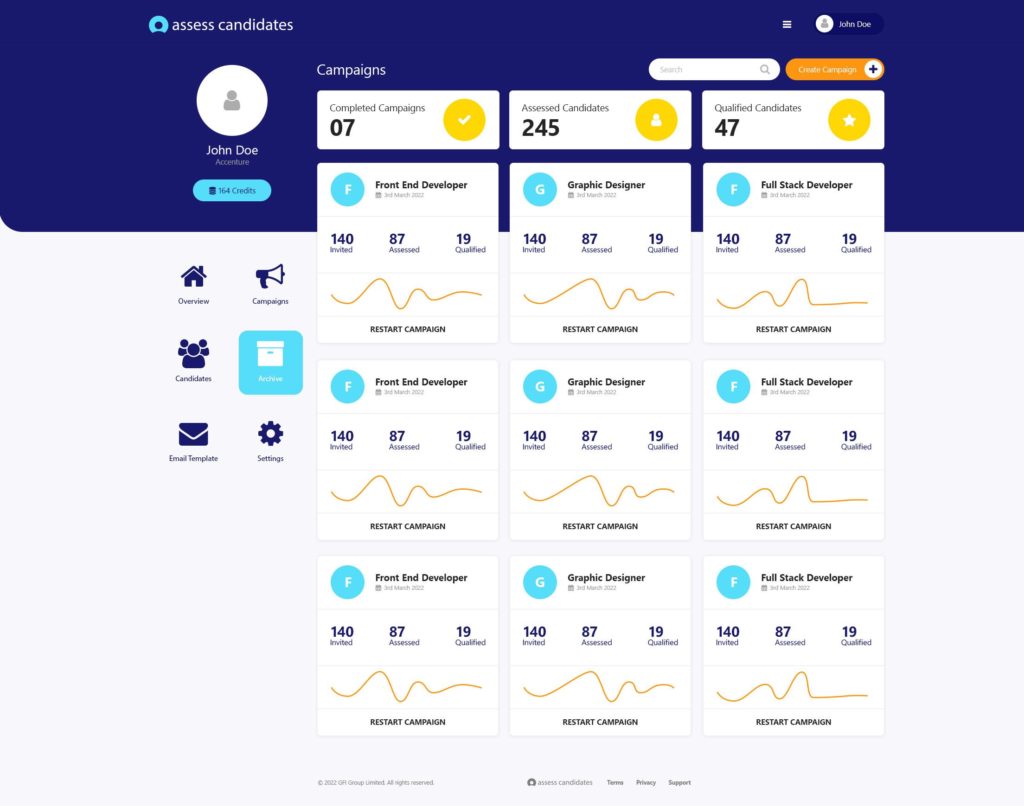
Above is an example of our reporting tool on Assess Candidates, that you as a hiring manager or talent acquisition expert will see when reviewing candidate performance.
Four reasons why to use Assess Candidates:
1. Experienced psychologists developing top industry tests
- Assess Candidates’ (AC) logical reasoning tests are developed by chartered scientists, psychologists and psychometricians who have previous experience in developing assessment solutions. Our experts have developed assessments for companies such as SHL and IBM Kenexa.
- Our tests have gone through rigorous testing, validation and have proven to select top talent in multiple organisations.
- AC’s collection of logical reasoning tests is one of the many engaging psychometric assessments that have been successfully used to help hire high-performance candidates.
2. Best-in-class reports enabling to shortlist your candidates fast using flexible criteria
- At Assess Candidates, employers can make their hiring decisions with confidence through an easy-to-use hiring assessment platform. You can view candidate performance in two ways:
- One: An overview of all individual candidate results for your hiring campaign that have applied for each vacancy.
- Two: Recruiters can view all candidates’ performance including the tests they have taken and how they have performed.
- Easily select how well candidates must perform in each assessment to identify how well they have to perform to move to the next stage.
- At Assess Candidates, our in-house occupational psychologists can advise on making hiring decisions and best practise performance thresholds.
3. Engaging Candidate Experience
- In today’s world candidate experience matters. The best candidates participate in multiple selection processes, and naturally have the option to select the employer of their choice. Candidate experience can affect this decision-making process: a candidate experience that resonates is more likely to translate into a favourable impression of an employer which, in turn, translates to a greater likelihood of that employer being selected. See Virgin Media’s analysis in 2017 of their prior recruitment processes for a must-read case study.
- Our logical reasoning assessments have an easy-to-use and friendly interface and the tests can be accessed from any device. They are easily accessible with features such as clear instructions on how to complete the test and a time limit embedded to make sure candidates know how long they have left. We ensure a user-friendly experience by using reduced clicks, with the assessment automatically moving onto the next question when answered, for example. Our engaging assessments are delivered on a fully branded and GDPR-compliant portal for a seamless experience.
4. Candidate Accessibility Support
- Assess Candidates ensure easy accessibility for all when moving around the platform and completing the logical reasoning test.
- All assessments we provide have the option of including additional time for those who need it such as people with dyslexia.
- We have incorporated a zoom feature on all assessments, to make the process easier for those who have visual disabilities.
- Our in-house developers have avoided the use of images throughout the platform in line with the Web Content Accessibility Guidelines (WCAG) to allow for the use of screen readers.
- We have also avoided the use of certain colours around the platform for those suffering from colour blindness.
